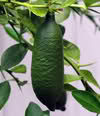| Author |
Message |
ilyaC
Citruholic


Joined: 04 Sep 2009
Posts: 276
Location: France, 40km South of Paris
|
| Posted: Sun 08 Nov, 2009 6:48 pm |
|
Hello,
Eight years ago I bought from Bernhard Voss Ichangquat 6-7-2. It is now a tree of almost 4 meters high.
Last year I got late flowering in autumn, but this year few flowers started to appear from June and I got one small fruit on November 1st.
Can not really tell about its quality, since it is so small. Rather juicy, no seeds.
I wonder if anybody have it and what are your experience.
For me it has been extremely hardy. This winter was tough, almost three weeks of frozen ground without snow, with temperature bottoming at -13.5C (7.7F). No damage at all, while citranges lost leaves with some twig death.

_________________
Best regards,
Ilya |
|
| Back to top |
|
 |
Millet
Citruholic


Joined: 13 Nov 2005
Posts: 6657
Location: Colorado
|
| Posted: Sun 08 Nov, 2009 11:02 pm |
|
Not surprising that your Ichangquat survived the cold temperatures. Its Ichangenisis parent is the most cold hardy of all species in the orange subfamily. Welcome to the Citrus Growers Forum. We are happy that you have joined. - Millet (1,165-) |
|
| Back to top |
|
 |
Laaz
Site Owner


Joined: 12 Nov 2005
Posts: 5668
Location: Dorchester County, South Carolina
|
| Posted: Sun 08 Nov, 2009 11:52 pm |
|
Bernhard is a member here. He may have so more information for you. Welcome to the forum.
_________________
Wal-Mart a great place to buy cheap plastic crap ! http://walmartwatch.com/ ...
 |
|
| Back to top |
|
 |
ilyaC
Citruholic


Joined: 04 Sep 2009
Posts: 276
Location: France, 40km South of Paris
|
| Posted: Mon 09 Nov, 2009 5:26 am |
|
| Millet wrote: | | Not surprising that your Ichangquat survived the cold temperatures. Its Ichangenisis parent is the most cold hardy of all species in the orange subfamily. Welcome to the Citrus Growers Forum. We are happy that you have joined. - Millet (1,165-) |
Theoretically it is like this, but my pure ichangensis died several years ago after only -12C. Certainly it was not as big as ichangquat at this moment, but still it was strange.
Also, the long freeze is much more damaging that just one cold night. And I suspect that most of the data on cold hardiness comes from such short episodes.
Ichangquat 6-7-2 originally comes from US but I has not been able to find more information on it.
_________________
Best regards,
Ilya |
|
| Back to top |
|
 |
Millet
Citruholic


Joined: 13 Nov 2005
Posts: 6657
Location: Colorado
|
| Posted: Mon 09 Nov, 2009 1:19 pm |
|
Ilya, a very important factor concerning how cold hardy any citrus variety becomes, is the weather preceding a freeze. All citrus gradually increase in cold hardiness as the fall and winter weather gradually becomes colder. As the seasons progress, and the temperature's continue to decrease, a citrus tree (ichangensis included) become more and more hardy, thus are able to survive lower and lower temperatures. Therefore, if the weather preceding a freeze had been warm, the tree would not have build up any cold hardiness, and would be very susceptible to damage or death. Even after a tree has developed great hardiness, the weather goes through a warm spell, a citrus tree again loses all cold hardy protection. So whether a tree has damage or not depends a lot on climatic conditions. - Millet (1,164-) |
|
| Back to top |
|
 |
ilyaC
Citruholic


Joined: 04 Sep 2009
Posts: 276
Location: France, 40km South of Paris
|
| Posted: Mon 09 Nov, 2009 4:35 pm |
|
| Millet wrote: | | Ilya, a very important factor concerning how cold hardy any citrus variety becomes, is the weather preceding a freeze. All citrus gradually increase in cold hardiness as the fall and winter weather gradually becomes colder. As the seasons progress, and the temperature's continue to decrease, a citrus tree (ichangensis included) become more and more hardy, thus are able to survive lower and lower temperatures. Therefore, if the weather preceding a freeze had been warm, the tree would not have build up any cold hardiness, and would be very susceptible to damage or death. Even after a tree has developed great hardiness, the weather goes through a warm spell, a citrus tree again loses all cold hardy protection. So whether a tree has damage or not depends a lot on climatic conditions. - Millet (1,164-) |
Millet,
Completely agree with you. That is exactly my observation on citrus cold hardiness. But when you grow them side by side the cold spells like this year winter in Europe are very instructive .
_________________
Best regards,
Ilya |
|
| Back to top |
|
 |
ilyaC
Citruholic


Joined: 04 Sep 2009
Posts: 276
Location: France, 40km South of Paris
|
| Posted: Sat 19 Dec, 2009 5:00 pm |
|
It seems that not many people have this interesting hybrid.
From the end of July-August flowering I harvested in the begining of December (just before the frost) three more fruits:

I kept the largest in the house untill it turned yellow:


If compared to the ripe Thomasville it is much less acid, rather juicy, good and aromatic flavor of the pulp, the inner layer of the rind is sweet, resembles kumquat, but the peel itself has very strange "foxy" smell.
Overall I prefer its taste over Thomasville. It is also more hardy and the ripening is earlier.
_________________
Best regards,
Ilya |
|
| Back to top |
|
 |
Roberto
Citruholic

Joined: 02 Jun 2009
Posts: 132
Location: Vienna/Austria
|
| Posted: Wed 30 Dec, 2009 12:39 pm |
|
Bonsoir Ilya,
You wrote, that your C. ichangensis died after -12°C. A had a look at mine today. They look quite well after -13,5°C (without protection). Leaves show some damage and I suppose the plants will loose most of them. All trifoliate hybrids show some damage as well. I think some Protection would have helped. Facit: there is no Citrus except Poncirus one could leave without protection in zone 7b. But maybe the problem again was sun nut freeze.
Salut
Robert |
|
| Back to top |
|
 |
ilyaC
Citruholic


Joined: 04 Sep 2009
Posts: 276
Location: France, 40km South of Paris
|
| Posted: Wed 30 Dec, 2009 5:06 pm |
|
Hello Robert,
For almost ten years I am experimenting (without any cover) with so called hardy citrus hybrids in my Northern zone 8 climate.
I lost very many plants due to sudden combinations of unfavorable weather conditions. I am inclined to agree with you that only poncirus can be regarded as absolutely hardy here.
Citrus ichangensis for example: I lost it after a sudden two night freeze in late March. The plant has not lost all its leaves but is dead of wood rot in May. The same freeze is lethal to my Ichang Lemon but not to Ichangquat or poncirus hybrids.
These later hybrids are very sensitive when I have the third growth in September and the young branches are frozen by only -6C nights and eventually are rotten in Spring. This type of sensitivity is less pronounced when trees mature and limit their growth to summer.
We also have here every third winter a long term freeze ( 1-2 weeks of day time under 0C) This is the most dangerous for all hybrids, since when combined with sun it irreversibly dries the plants.
My general impression is that for every climate one need to select very special adapted hybrids. It is pity that not much of such selection took part in Europe.
This probably explains why after almost a century of crossing with citruses only pure poncirus can be grown reliably in the North of France.
_________________
Best regards,
Ilya |
|
| Back to top |
|
 |
Roberto
Citruholic

Joined: 02 Jun 2009
Posts: 132
Location: Vienna/Austria
|
| Posted: Sat 02 Jan, 2010 4:30 pm |
|
Hello Ilya,
Do you use Poncirus as rootstock for all your plants? I think roots would have survived if you had budded C. ichangensis on P-rootstock. I know that budding limits the life of plants, but in our case I will use this method.
Regards
Robert |
|
| Back to top |
|
 |
ilyaC
Citruholic


Joined: 04 Sep 2009
Posts: 276
Location: France, 40km South of Paris
|
| Posted: Sat 02 Jan, 2010 5:43 pm |
|
Roberto,
Yes, all my citruses are budded on trifoliata.
Ilya
_________________
Best regards,
Ilya |
|
| Back to top |
|
 |
jm
Citruholic


Joined: 04 Dec 2006
Posts: 58
Location: Bordeaux, south west France, zone 8b
|
| Posted: Sat 09 Jan, 2010 7:34 am |
|
| Roberto wrote: |
I think roots would have survived if you had budded C. ichangensis on P-rootstock. |
In this case, you would have had a poncirus not a citrus ichangensis. |
|
| Back to top |
|
 |
Roberto
Citruholic

Joined: 02 Jun 2009
Posts: 132
Location: Vienna/Austria
|
| Posted: Tue 12 Jan, 2010 6:09 pm |
|
of cause, if only the rootstock survives. But C. ichangensis should survive -12°C under normal circumstances. Grafting on Poncirus should give the scion some extra hardiness. |
|
| Back to top |
|
 |
ilyaC
Citruholic


Joined: 04 Sep 2009
Posts: 276
Location: France, 40km South of Paris
|
| Posted: Tue 12 Jan, 2010 6:25 pm |
|
I got -15.8C four nights ago. The local weather station registered even -17C.
http://fr.weather.com/weather/monthly-Melun-FRXX0061
This type of winter is happening once in 25-30 years here.
For the moment Ichangquat ( completely unprotected) is showing partial browning of leaves in upper branches, but spring is still very far.
_________________
Best regards,
Ilya |
|
| Back to top |
|
 |
Roberto
Citruholic

Joined: 02 Jun 2009
Posts: 132
Location: Vienna/Austria
|
| Posted: Thu 14 Jan, 2010 7:47 am |
|
Hi Ilya,
Plus permanent freeze? Sounds bad. This could be a real testimonial for cold hardy citrus. I keep my fingers crossed.
Salut
Robert |
|
| Back to top |
|
 |



























